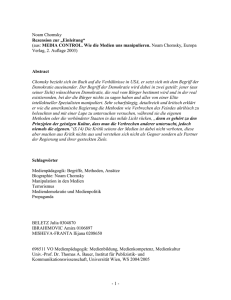

An ideological filter described as anticommunism (due to Manufacturing Consent being published during the final years of the Cold war).The ability of financially or politically privileged actors to provide flak, negative responses to critical media coverage and.The reliance on ‘trusted sources’ which frequently means using government or corporate spokespeople who spend vast sums on public relations and lobbying.The economic model predicated on generating revenue via corporate advertising.The size and ownership of mass media corporations.The five filters proposed by Chomsky and Herman are: Chomsky and Herman go beyond Habermas, Adorno and Horkheimer, however, in delineating what they see as a series of structural filters through which ‘the powerful are able to fix the premise of discourse, to decide what the general populace is allowed to see hear and think about.’ (1988:1) Chomsky and Herman 1988:1Īs such Chomsky and Herman operate within the tradition of Marxist critique of mass media as ideological propaganda whose purpose is not to inform rational critical societal debate, but to naturalise the ideology of the ruling classes. In a world of concentrated wealth and major conflicts of class interest, to fulfil this role requires systematic propaganda. It is their function to amuse, entertain, and inform, and to inculcate individuals with the values, beliefs, and codes of behaviour that will integrate them into the institutional structures of the larger society. The mass media serve as a system for communicating messages and symbols to the general populace.


 0 kommentar(er)
0 kommentar(er)
